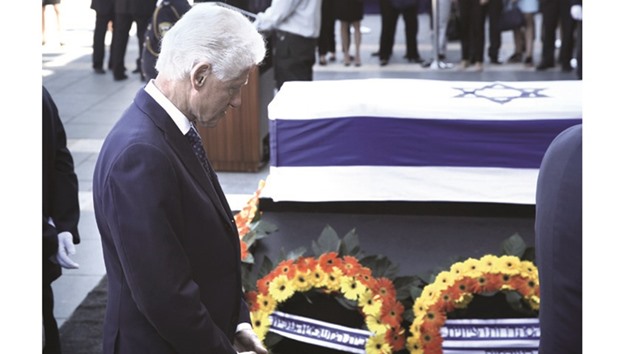Mourned internationally as a peacemaker, Israeli ex-president Shimon Peres’s death has met with official silence in most Arab countries, where public opinion vilified the Nobel laureate as a “war criminal”.
Of the 21 Arab states, only two — Egypt and Jordan — have full diplomatic relations with Israel.
Even in those countries, the legacy of their destructive wars with Israel and its policies towards Palestinians continue to influence public opinion.
Peres, who died at 93 on Wednesday, was widely viewed in Arab countries as one of Israel’s founding fathers and closely associated with its policies towards Palestinians.
He is remembered internationally as the man who won the Nobel Peace Prize in 1994 along with then prime minister Yitzhak Rabin and Palestinian leader Yasser Arafat.
But Arab media coverage has focused on his role in Israeli military action. “Peres, the engineer of the Qana massacre, dies,” said a front page headline in Al Ahram, Egypt’s flagship state newspaper.
Peres was the prime minister in 1996, having taken over after the assassination of Rabin by a Jewish extremist for signing the peace treaty with the Palestinians.
During a 16-day war with the Lebanese Hezbollah militant group that year, Israel shelled a United Nations compound where Lebanese fleeing the conflict had taken refuge. One hundred and six civilians were killed.
Israel said the shelling of the compound near the village of Qana was accidental.
“Peres dies: the ‘butcher’ of Qena,” read a headline on the website of the Lebanese daily Al Safir.
“A thousand damnations on his soul, although he’s in hell,” said Lebanese Public Health Minister Wael Abou Faour.
“I had wished for him a death that suited his crimes against Arabs and Palestinians. The only thing we mourn is that the devil is overjoyed because his counterpart has joined him.”
Most other Arab officials remained silent, with the exceptions of Palestinian President Mahmoud Abbas, who said Peres was “brave”, and Bahrain’s foreign minister. “Rest in Peace President Shimon Peres, a Man of War and a Man of the still elusive Peace in the Middle East,” Bahraini minister Khaled ben Ahmed al-Khalifa wrote on Twitter.
There was no official comment in Jordan and Egypt, which in 1979 became the first Arab country to sign a peace treaty with Israel.
Public opinion in both countries remains hostile to Israel.
Earlier this year, an Egyptian member of parliament was attacked with a shoe by a colleague for hosting Israel’s ambassador for dinner.
Parliament later voted to deprive him of his seat.
In Jordan, which signed a peace treaty with Israel in 1994, a majority of the population is of Palestinian origin.
Jordanian newspaper Al-Rai railed against the “hypocritical discourse of the colonising West” for describing Peres as a man of peace.
The article was headlined “The Godfather of settlements and a murderer...who feels sorry for him?” in reference to Israeli settlements in Palestinian territories.
Barak Ravid, diplomatic correspondent with the liberal Israeli newspaper Haaretz, lamented the response of Arab officials to Peres’ death.
“The silence from Arab leaders towards (Peres’s) death especially in Egypt and Jordan is shameful...It is inhumane and immoral,” the Israeli journalist tweeted in Arabic.
“Did (Peres) ever admit or apologise for his inhumane and immoral acts and policies towards the Arabs and Palestinians?” responded a Twitter user.

Former US president Bill Clinton pays his respects in front of the coffin of former Israeli president Shimon Peres outside the Knesset in Jerusalem.
